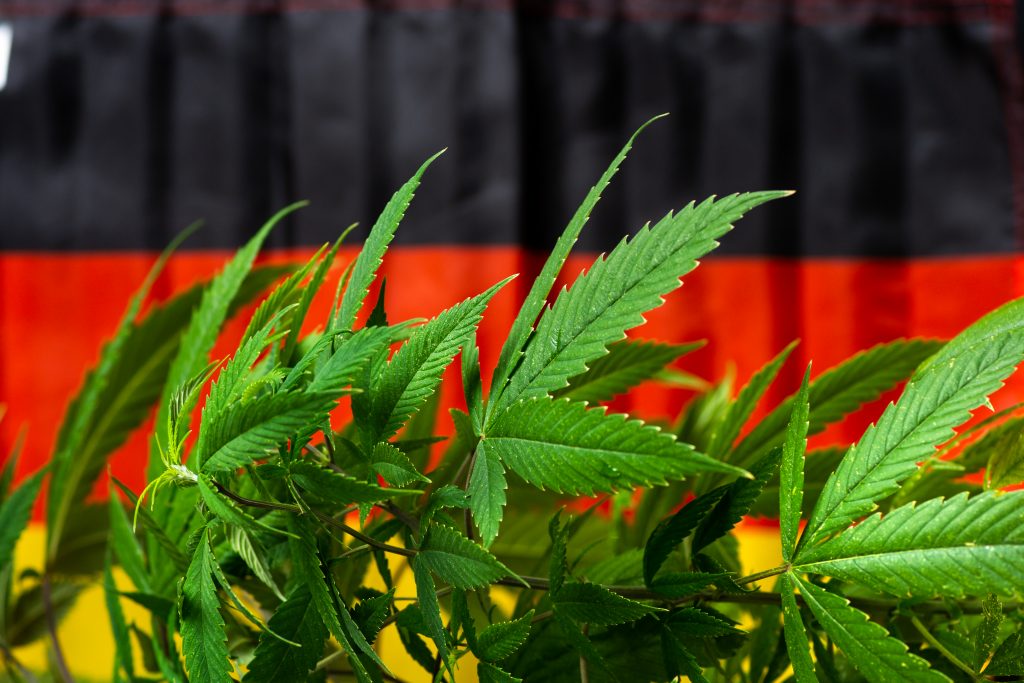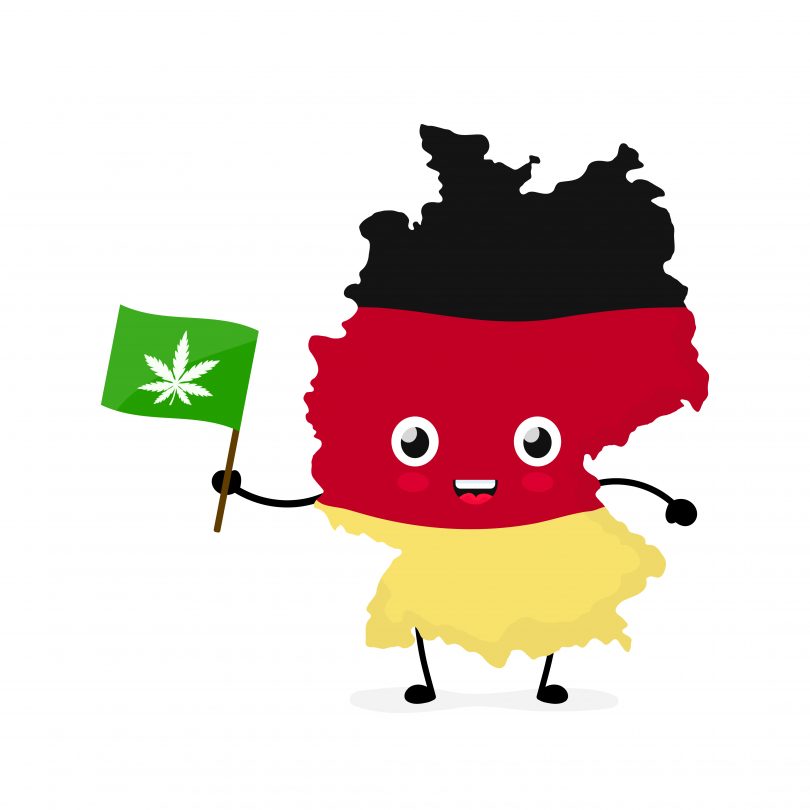The people of New Zealand just voted down a measure to legalize cannabis through a referendum. New Jersey just legalized it recreationally also through its own referendum. Germany didn’t put the question to its people, but last month the government of Germany rejected its recreational cannabis bill.
The world of legal cannabis is constantly changing! Sign up to our newsletter to get all the top stories, and keep yourself in the know.
A little about Germany and cannabis
As per the title, recreational marijuana is not legal in Germany. In fact, possessing it at all can garner a person up to five years in prison according to the German Federal Narcotics Act, though conversely, it’s not technically illegal to use it, since there is no stated law against it. If caught with small amounts, offenders are usually put in a program over anything more serious, at least for first-time offenders. The term ‘small amount’ is not very well defined, though, and can mean anywhere from about 6-15 grams depending on where in Germany the possession takes place. Plus, the amount is judged by quantity and potency over actual weight, meaning the THC content helps define the amount in the end.
Sale and supply crimes are predictably illegal, and offenders can receive up to about five years in prison. This sentence goes up from 1-15 years depending on the circumstances of the case. Cultivation on a personal level is also illegal and garners the same punishment as sale and supply crimes.

In terms of CBD, while Germany already had been permitting it, the recent decision of the CJEU (Court of Justice of the European Union) in the case of France vs the EU, makes it that much more clear. EU standard has now been found to trump local member state laws when it comes to the import and export of CBD between member states. As per EU standards, Germany does not allow more than .2% THC in CBD oil preparations.
Technically, the medical use of a cannabis drug has been legal since 1998 in Germany when dronabinol was rescheduled. It wasn’t until 2017, however, that Germany further legalized medicinal cannabis. As of 2017, new legislation opened the door for more disorders and sicknesses to be relevant for treatment.
What about Germany’s market?
The thing about Germany is that it already has one of the biggest cannabis markets in the EU, and even in the world, though right now it’s all a medicinal market. In 2019, for example, Germany was the biggest importer and exporter of cannabis oil in the EU. Though the country can’t compete just yet with the US in terms of imports – the US for 2019 imported approximately $893 million worth of cannabis oil making it the clear leader, Germany did get the #2 spot with $240 million worth of oil imported that year. When it comes to exports, Germany led the EU with about $230 million worth of cannabis oil exports, but that was only 4th place in the world. Topping the export list was China, sitting pretty with just under $1 billion worth of cannabis oil exports that year.
Cannabis oil is only part of it. Most of the legal cannabis world still revolves around dry flowers, and Germany just happens to have a massive cannabis flower market as well. And one that is only looking to grow and expand out more. In July, Germany released data on its medical cannabis imports for the first two quarters of the year. While Q1 showed an increase of 16%, Q2 showed a massive 32% increase, and this at the height of the Coronavirus pandemic measures being taken all over the world. To give an idea of what this means via comparison, in 2018, Germany imported about 3.1 tons of cannabis flowers, this was increased to 6.7 tons in 2019, and it looks like it will go much higher than that by the end of 2020. During this time, Germany had such an issue with supply problems that it requested extra cannabis flowers from the Netherlands to help close the gap. Part of the reason for the need for more medical cannabis is simply the increasing number of Germans receiving it as treatment. As of June 2019, about 60,000 Germans were registered with the medical marijuana program in the country, and that number is sure to be way higher by now.

Up until recently, Canada and the Netherlands were Germany’s two biggest and main suppliers of cannabis flowers. However, more recently, it looks like Germany has received flowers from Uruguay (through a secretive back-door move using Portugal to import), and Spain via Linneo, a Spanish cannabis producer. Canada, however, is still the main importer to Germany, with several new companies opening shop in Germany, or planning new exports to the country. To give an idea of how out-of-whack prices have gotten in Germany, consider that the current retail price of a gram of cannabis is about €20. Then consider that this is a medical price, not even a recreational price.
What’s the deal with recreational?
Everything so far should give some idea of how big Germany’s cannabis market is, and how quickly it’s growing. As the biggest market in the EU, it’s not that surprising that the question of a recreational legalization would come up, since, obviously, Germany is pretty okay with use of the plant. However, this sentiment did not come through as a recreational legalization as last month Germany rejected its recreational cannabis bill.
Germany has six main political parties. The Left (holds 69 seats and is in favor of legalizing), the Social Democratic Party of Germany (about 152 seats, technically in favor of legalization, but voted with coalition partner instead – the Union, which includes the Christian Democrats led by Angela Merkel), the Union (two parties making up 264 seats, against legalization), the Greens (67 seats, and in support of legalization), the Free Democratic Party (holds 80 seats, but did not vote on the measure), and Alternative for Germany (somewhere in the neighborhood of 89-94 seats, and against legalization).
On October 29th, the proposed bill for an adult-use recreational cannabis market in Germany was firmly rejected in parliament, despite having plenty of support from different factions of Germany’s parliament. One of the big reasons for this is the coalition between the Union and the Social Democratic Party of Germany. The Union is itself is a coalition between the Christian Democratic Union of Germany (led by Angela Merkel) and the Christian Social Union in Bavaria. The Social Democratic Party of Germany, which though technically is in favor of cannabis reform, tends to vote with its coalition partner, the Union. Together they hold enough seats that any initiative will fail without at least some of their support. In this way, by having the two parties paired together, Germany rejected its recreational cannabis bill squarely.

In a way, the coalition is a strange one. The Union, is known as a center-right party associated with Christian movements. The Social Democratic party is center-left. Technically, the two groups have very different stances, and while they might overlap on some issues, they actually seem quite at odds when it comes to cannabis, making their vote together a bit of a headscratcher. Nevertheless, by being joined together, the Social Democrats voted with the Union making for an unbeatable force.
What’s next for Germany?
In the wake of the fact that Germany rejected its recreational cannabis bill, it’s hard to imagine what the next step will be. Unlike with a country like New Zealand, it was not the people of the country who voted the measure down, but rather, parliament on its own. This means the people of Germany are not necessarily on board with this decision, and that could mean new measures arising in the near future. It is, after all, already one of the biggest cannabis markets in the world. The step to legalization gets smaller and smaller as Germany gets more and more saturated with cannabis. Personally, I expect something will happen very soon that will tip the balance in the other direction.
CBDtesters is your hub all cannabis-related news. Visit us regularly to stay in the know, and sign up to our newsletter so you never miss a beat!
Resources
Germany Leads EU in Cannabis Oil Imports…and Exports
Mexico Still Waiting on Its Promised Cannabis Legalization
German Cannabis Flower Market is Ready to Explode
Recreational Cannabis is Legal in Georgia – But Who Knew?
Fly with Cannabis – Which Countries Let You Do It Newest Cannabinoid Powerhouse – CBC – What Can It Do for You?
What is DELTA 8 THC (FAQ: Great resource to learn about DELTA 8THC)
Legal for a Day – The Mahashivaratri Festival and Nepal’s Changing Cannabis Laws
German Cannabis Flower Market is Ready to Explode
The CBD Flowers Weekly newsletter (your top resource for all things smokable hemp flowers)
The Medical Cannabis Weekly newsletter (International medical cannabis business report)
Customize Your Cannabinoids – Now You Can Mix’ N’ Match
The Delta 8 Weekly Newsletter (All you need to know about Delta 8 thc) and the Best Black Friday Delta 8 THC Deals 2020. Cannabis Election Results – Best Black Friday Delta 8 THC Deals 2020
EU Beat France, CBD Legal Throughout EU
THC Isolate Explained – Everything You Need To Know
A Complete Guide To CBN Isolate (Cannabinol)
Get EU GMP-Certified Cannabinoid Isolates and Distillates









